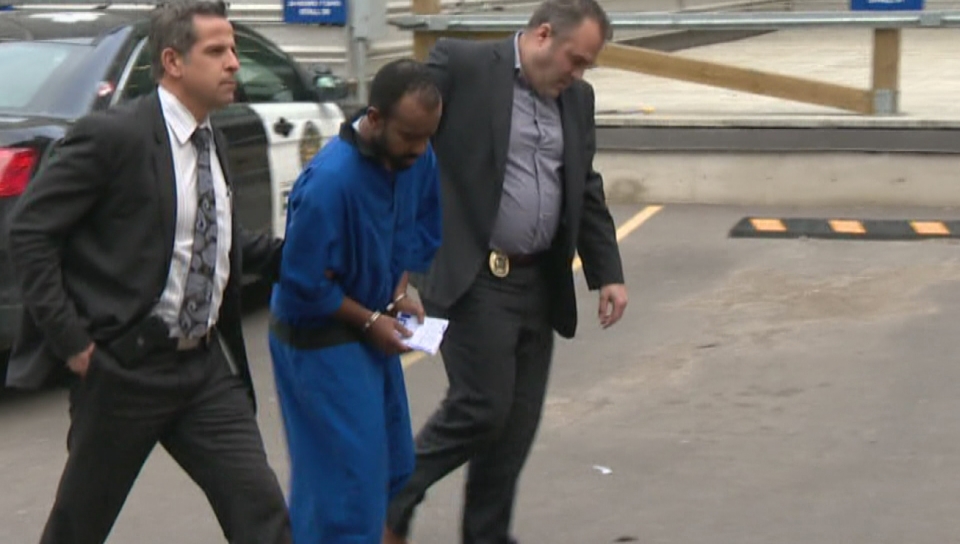Alberta’s highest court has upheld first-degree murder convictions against a man who stabbed his mother and a woman with a developmental disability his mom was caring for in her home.

Emanuel Kahsai of Calgary was convicted in 2018 of killing his mother, Selma Alem, and Julie Tran. He was sentenced to life without parole for a minimum of 50 years.
The 25-year-old Tran had fetal alcohol syndrome disorder and was one of two people Alem was caring for at the time of her death.
The two women were found dead with multiple stab wounds in October 2015 in Alem’s home in the Coventry Hills neighbourhood, court documents say.

Kahsai appealed on several grounds, including that he failed to defend himself in a meaningful way, that jury selection was flawed and that a lawyer should have been appointed to him early in the court proceeding.
The Appeal Court denied his appeal in a 2-1 decision. The appeal was heard in October 2020, but the reasons for the decision were released Thursday.

Get breaking National news
In his dissenting opinion, Justice Brian O’Ferrall wrote he would have ordered a new trial for Kahsai, who represented himself.
“The accused, Mr. Kahsai, failed to make full answer and defence,” O’Ferrall wrote. “His failure to do so was his own fault, but I do not believe that ends the matter.”
O’Ferrall said the trial judge should have ordered a lawyer to advocate for Kahsai, even though he did not want one.
“Forcing counsel on an unrepresented accused when the court is satisfied that the accused’s conduct on the case will make a fair trial impossible does not infringe upon an accused’s right to control his own defence,” the judge wrote.
“It preserves his right to a fair trial. It protects his right to life, liberty and security.”
Justices Bruce McDonald and Ritu Khullar disagreed.
McDonald wrote that forcing legal representation on Kahsai would “be an affront to his autonomy as an individual and is unacceptable in a free and democratic society.”
He said the Crown presented a compelling case that Kahsai killed his mother and Tran.
“Furthermore, in my opinion, there was sufficient evidence that a properly instructed jury could have reasonably concluded that the killings of both victims were planned and deliberate.”

The judges noted that Kahsai was unco-operative and disruptive throughout the entire court proceeding. He was assessed three times by psychiatrists who said he was “feigning” mental illness and was fit to stand trial.
“The appellant said, `There’s another criminal’ after the trial judge said good morning to him,” McDonald wrote. “He talked over the trial judge and ignored warnings.”
McDonald said Kahsai was given every chance to retain a lawyer but refused each time.
- Luigi Mangione perp walk: Did it garner more support for suspected killer?
- ‘Sadistic’ Quebec killer convicted of triple family murder gets life in prison
- Man arrested in Quebec for alleged plot to kill Jews in NYC transferred to Montreal
- California campaign manager charged as alleged Chinese foreign agent
The court-appointed a lawyer, known as an amicus, to assist in jury selection.
McDonald said Kahsai didn’t co-operate and, instead, held up signs to the lawyer saying “help” and asking her to contact the FBI or United States government. He didn’t want to speak to her and called her disgusting.
“When (Kahsai) cross-examined Crown witnesses (at trial), he engaged in disruptive behaviour, asked inappropriate questions and, for the most part, failed to ask relevant questions that would advance his defence,” McDonald wrote.
Another lawyer was then appointed by the court, but the judge instructed him not to advocate on Kahsai’s behalf, but instead to “assist the court by using his ability to question witnesses to identify evidence that was relevant to the charges.”
“The appointment of an amicus to a defence-like role may conflict with the accused’s constitutional right to represent himself,” McDonald said.
“In my opinion, the trial judge, the pretrial judge and the jury selection judges all did their best to ensure fairness.”







Comments